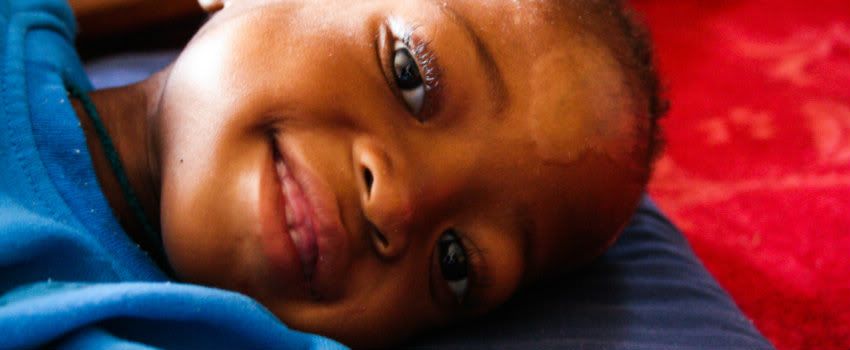My emotions are running high. I am still processing everything that happened. Writing is always cathartic for me, and so I've turned to write here:
I was woken up this morning with the all too familiar phrase, "Ntate Kevin, we need your help."
I jumped up, got dressed, and went down to the safe-home. There, in the changing room, was an 8-month-old TTL client named Thabiso. He looked the proper weight, looked relatively healthy, but his face was blank. I waved my hand in front of his eyes, to no response.
I followed Shamena, one of our safe-home caregivers, to the front of the office, to where the boy's parents were. The mother was crying, the father looked stricken. I asked what the problem was with the child, and was told that he was vomiting and had diarrhea and had been suffering from a high fever for about two days. I knew the combination of these symptoms to be an extremely serious one in young kids, and told the parents that they needed to take the boy to the hospital immediately.
Shamena and I went back to the changing room to get the boy, and knew immediately the awful truth: he was dead. We went through a few standard checks to confirm the grim reality that we already knew to be true. Shamena then tried to close little Thabiso's eyes, but they wouldn't remain shut. We were both uneasy. There were the parents in the other room. They had come to us for help, but it had been too late.
I scooped the tiny body into my arms and carried the bundle back to the parents. Few words were exchanged. I offered my condolences, and the mother wailed, and the father still seemed stricken.
I called Matello, our outreach coordinator, and went and picked her up from town and brought her back to TTL. She spoke with the parents briefly, and it was determined that we would take them and their lost child back to their village.
We all got in the car and started the long drive out to St. Martin, where they are from. About an hour into the trip, Thabiso's father had us stop in a village where a large number of people had gathered to welcome back a group of boys who had just gone through circumcision initiation. There he had a man on the street go and fetch his two brothers, Thabiso's two young uncles, who he knew to be there.
Again, the scene was hugely emotional, and the mother wailed, and the uncles shook in disbelief at seeing their brother and his wife obviously going through unbearable pain.
We continued on. When we got to their village, we all got out. Again the mother began wailing, which announced the horrible news to the village as we entered it. Neighbors and family members began pouring out of rondavals and coming to the grieving couple and the two uncles. The women went to the side of the mother, the men to the sides of the father and uncles.
We went into a large rondaval. One of the uncles collapsed against the wall and slid into a pile on the floor, weeping. Women formed a circle on the floor around Thabiso's mother, and collectively they moaned and rocked in anguish.
Village elders began arriving. I felt awful for the family, awkward and strange for being in this tight circle of grief as an outsider. One of the elders began praying, and we all dropped our heads in silence.
On the long drive home, Matello told me that Thabiso was the seventh of seven children of the young couple to die. The first six had all died in the first few months of their lives. Thabiso, at 8-months-old, had been their great hope. He had been healthy until the sudden fever and onslaught of diarrhea and vomiting.
Now back at TTL, I am still trying to process my morning. I feel so bad for the young couple. Why have they been given such a disproportionate amount of grief?
Is there an answer?

